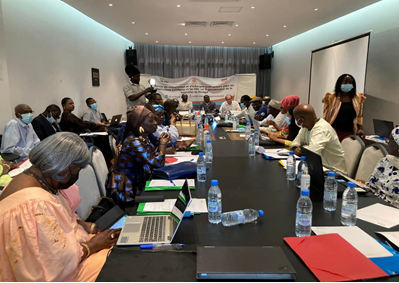1. Multi-stakeholder consultation and exchange workshop between public institutions and CSOs on the governance of migration in Senegal
“REMIDEV advocates for the establishment of a national strategy in Senegal. The issue of irregular migration was the focus of a multi-stakeholder consultation and exchange session. This meeting brought together public institutions and civil society organizations on the governance of migration in Senegal. It was held from June 8 to 9, 2002. Under the initiative of the Migration Development Network (REMIDEV), actors working in the sector addressed several aspects of migration in all its forms. The objective of this meeting was to promote a constructive dialogue between actors for a better governance of migration in Senegal. Thus, recommendations will be issued and addressed to the competent authorities of this country. The challenge is to ensure that actions are taken to sustain not only the exchange plan but also to call for the development of a national strategy. This is a very strong demand, said the member of the inter-ministerial committee for the fight against irregular migration.
For the coordinator of REMIDEV, Mrs. Gaye Aby Sarr, these exchanges are a logical continuation of an advocacy that has long been conducted by the actors. This advocacy was conducted on the basis of a technical document developed in 2018 but so far has not been adopted. It will be in this new document, to establish strategic options that will show the directions according to what the State of Senegal in any case is committed at the African level, at the scale of the sub-region but also at the international level.”
“We must apply it, implement this policy and I think that in all documents, the issue of data is thorny especially in Africa,” said Ms. Gaye.
2. Synthesis ” Wednesday of the IDHP (Institute of Human Rights and Peace) ” on June 07, 2022 in Saint Louis, Gaston Berger University

The current events call for migration issues; indeed, the world is witnessing the multiplication of situations leading to the displacement, voluntary or forced, of more and more people. This is the pretext that the Institute of Human Rights and Peace (I.D.H.P), in partnership with the Rosa Luxemburg Foundation and in collaboration with the Master’s degree in the Rights of People Living with Disabilities of the Gaston Berger University of Saint-Louis chose to organize a Wednesday of the IDHP around the theme: “The status of migrants: stateless persons, refugees, displaced persons”, animated by Professor Mbissane Ngom, Professor of Universities, with the moderation of Doctor Abdoulaye David SOW.
By focusing on the definitions given in the various international conventions dealing with migration issues, it is possible to distinguish between statuses linked to the crossing of a border and those that envisage displacement within the same State. In the first category, we find the stateless person and the refugee. The second group is that of the displaced.
Migration is usually conceived as a specific project, linked to a life goal or a better quality of life for the migrant and his or her family in the country of origin or abroad. When this migration is interrupted and return decisions have to be made before the objectives are achieved, the possibilities for reintegration are affected. Like departure, return is also the result of a complex decision-making process involving a wide range of factors.
3. Migration and democracy, the view of some returning migrants!
Through a report, RLS gives returnees, or organizations working for the successful reintegration of returnees, the opportunity to speak out on: the relationship between migration and democracy in Senegal, funds to support the reintegration of returnees…
4. Migrants Village in Hann-Yarakh, 2022 edition
In the framework of its partnership with the Rosa Luxembourg Foundation, the Migration Development Association organized on June 25, 2022 a meeting entitled MIGRANT VILLAGE at the Hann Yarakh Migrant Center.
The objective of this activity was to discuss the situation of refugees, asylum seekers and displaced persons residing in Senegal.
THE MIGRANT VILLAGE was attended by all ECOWAS member countries (Economic Community of West African States) and nationals from other African countries such as Central Africa and Congo as well as local associations and Senegalese returnees.
The objective of the meeting was to offer these vulnerable people a space for exchange and cohesion in order to formulate demands to face the difficulties they have been facing since their arrival in Senegal. But also to create a network to give more echo to their claims.
5. Critical analysis of Senegal’s national migration policy document
Senegal, through its migration policy document, is committed to effective migration management. However, a close analysis of the document reveals that improvisation seems to take precedence over the efficient management of the migration issue due to the absence of a coherent policy. In addition, the document takes up the main lines of the European Union’s migration policy and does not reflect the realities of Senegalese migration. It is, in a way, an internalization of European migration policy. In this report, we will attempt to analyze some of the shortcomings that appear to be essential in Senegal’s migration policy document and that are likely to compromise its implementation. This study follows the state of play of Senegal’s national migration policy document which made a technical adoption in 2018. It constitutes a critical contribution to Senegal’s migration policy document with respect to the strategic orientations outlined, the marginalization of economic development issues, human rights, and labor immigration in Senegal.
Fatou Faye (RLS Dakar)

